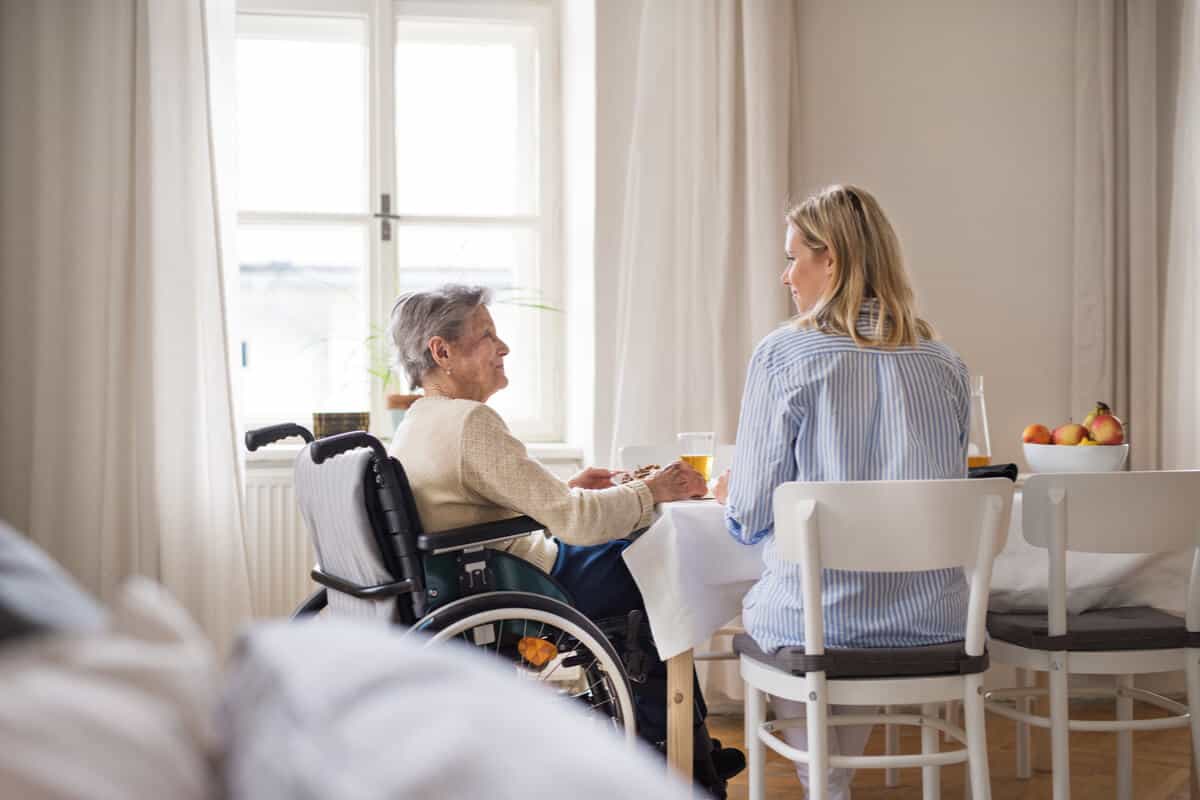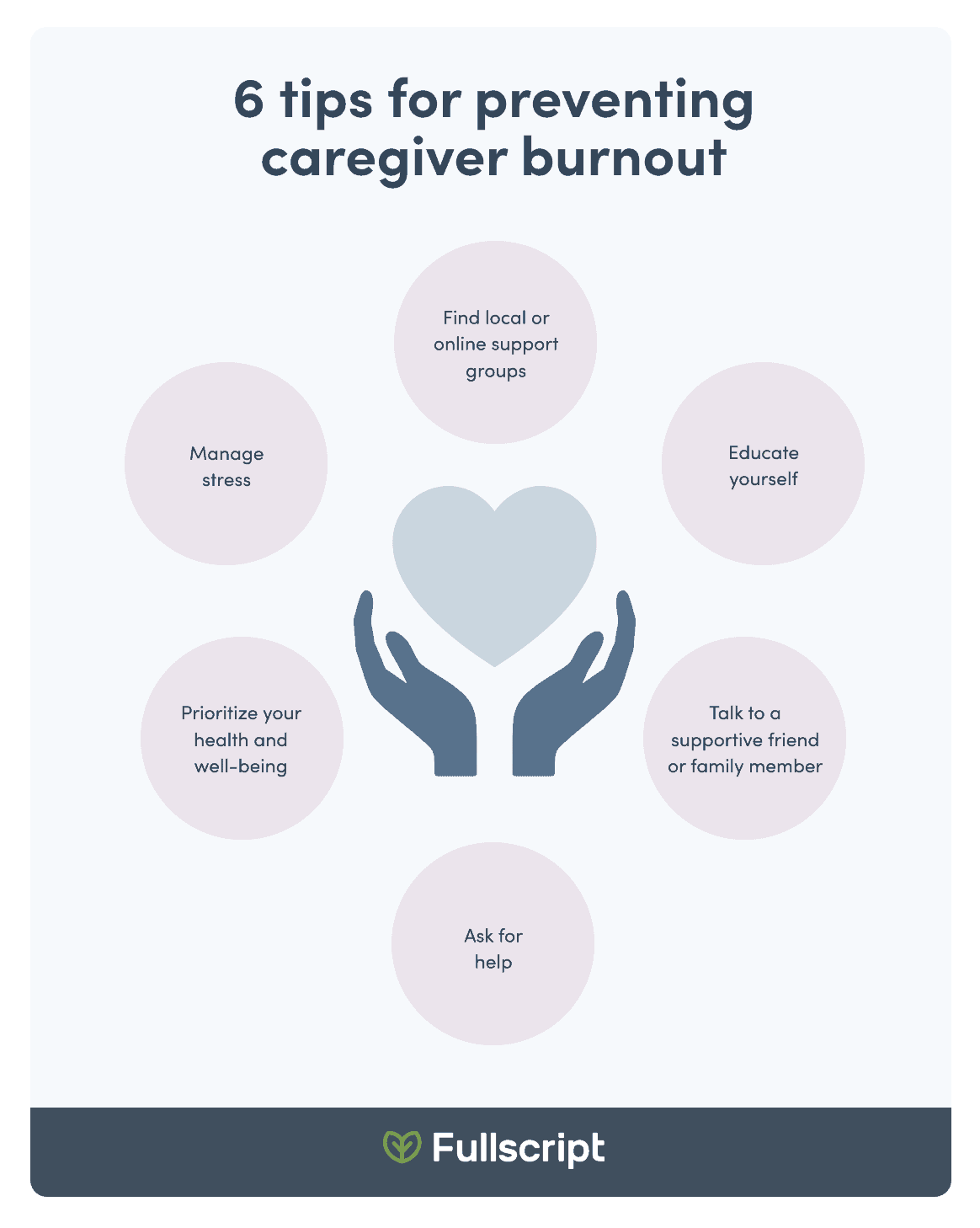
Caring for a loved one can be an equally rewarding and demanding responsibility.
What are caregivers?
Caregivers, sometimes referred to as informal caregivers, are individuals who provide care to friends or family members requiring assistance with daily tasks such as feeding, bathing, dressing, housework, shopping, and transportation. (3)(9) Care recipients may need assistance for a number of health concerns related to aging, physical or mental disability, or chronic illness. (9) Unlike professional caregivers, personal support workers, or licensed medical professionals, informal caregivers provide care to others without compensation and often in addition to maintaining other full-time responsibilities such as childcare or a career. (2) Even without sufficient training or support, informal caregivers are regarded as critical key players in healthcare and long-term care support. (6) With a growing aging population and workforce shortages affecting long-term care settings, the need for caregivers has grown significantly in recent years. (2) According to a 2020 report published by the National Alliance for Caregiving and AARP Public Policy Institute, 53 million adults in the United States were active caregivers or had cared for an adult or child with special needs in the previous 12 months. (2) Additionally, one in four Canadians, approximately 7.8 million people, provide care to a family member or friend requiring special care due to advanced age, a long-term health condition, or disability. (13)Did you know? Women make up the largest proportion of caregivers at 61%. The average age of caregivers in the United States is 49 years. (2)
What is caregiver burnout?
Caregiver burnout is a state of physical or mental exhaustion resulting from the stress and sometimes overwhelming responsibilities associated with caregiving. (7) Providing care to a friend or loved one can be a physically and emotionally demanding job. In fact, approximately 23% of caregivers report struggling to care for their own health and the same percentage of individuals report that caregiving has worsened their health. (2) If you’re a caregiver, it’s important to monitor changes in your physical, mental, and emotional health and consult your practitioner for help when needed. Common caregiver burnout symptoms include:- Anger or frustration
- Anxiety and stress
- Depression
- Emotional exhaustion
- Feelings of isolation (2)
- Inability to concentrate
- Increased susceptibility to infection
- Irritability
- Lack of interest in usual activities (11)
- Sleeplessness (1)(7)
Caregiver burnout prevention
The six tips described below can help prevent or mitigate the effects of caregiver burnout.
Follow these six tips to help support your health and well-being as a caregiver.
Find local or online support groups
Locating an in-person or virtual support group can help you cope with the stress and responsibilities that come with being a caregiver. Support groups can provide a safe and welcoming environment for you to express your feelings and concerns with others who can relate to your situation. (8) Support groups can also help you develop coping strategies, reduce feelings of isolation, and connect you with additional community resources. (12) Several studies have demonstrated the health benefits of attending support groups. According to a 2011 meta-analysis, support groups significantly improve psychological well-being, depression, and burden among caregivers. (5) If you’re unsure of where to go for help, start by looking into the services and resources provided by your local and federal government authorities in the United States and Canada.Educate yourself
If you are caring for someone with a chronic illness, it can be beneficial to learn as much as you can about their condition. In doing so, you may feel more comfortable and empowered to provide the best possible care and to be an effective advocate for your care recipient. When attending healthcare visits, don’t be afraid to ask your care recipient’s provider questions about their condition and treatment plan as long as you have the patient’s consent to do so. (14)Talk to a supportive friend or family member
If you’re feeling overwhelmed, call a family member or meet with a trusted friend. Expressing your feelings with others can significantly improve your emotional state and resilience to caregiver stress and burnout. Additionally, it’s important to maintain social relationships to avoid feelings of isolation that often accompany caregiving. (10)
Maintaining social connection and confiding in a trusted friend can help you manage caregiver burnout.
Ask for help
Depending on the level of care your friend or family member requires, it may not be realistic or even possible for you to be their sole care provider. Although it can be challenging to ask for help from others, it’s important to take periodic breaks to prevent burnout. Reach out to family members, close friends, or neighbors for assistance when possible. If you don’t have an established support network nearby, consider respite care or adult daycare, which can provide short-term relief for caregivers. (1)Manage stress
Chronic (long-term) stress can lead to adverse health outcomes and decreased quality of life. To best manage your stress levels, aim to engage in activities that you find enjoyable and relaxing, such as spending time in nature, staying active, or practicing a hobby. (4) Some research suggests that meditation may be particularly beneficial for helping caregivers manage stress. In a study of 31 families caring for a family member with dementia, meditation improved life satisfaction, the ability to cope with stress, and diurnal cortisol slope, a measurement of changes in cortisol (stress hormone) levels from morning to evening. (15)Prioritize your health and well-being
Staying on top of your own health should be a top priority for any caregiver. As a caregiver, you cannot provide adequate care to others if your own health is less than optimal. Support your health and well-being by continuing to visit your healthcare provider for routine check-ups or other necessary appointments, and adhere to your treatment plans if applicable. Further optimize your health by getting enough quality sleep, managing stress, exercising for a minimum of 150 minutes per week, and eating a balanced diet that includes an abundance of vegetables, fruits, lean proteins, nuts, seeds, and other nutrient-dense foods. (1) Download a guide on the fundamentals of health to learn more about the factors that influence well-being.The bottom line
Caregiving is an essential and rewarding responsibility; however, it can be accompanied by emotional, physical, and financial challenges. Prevent or mitigate burnout by prioritizing your health and well-being, asking for help, joining support groups, seeking emotional support from a friend or loved one, and managing your stress. If you’re a caregiver struggling to cope with the demands of your role, consult your integrative healthcare provider for help.- AARP. (2020). Caregiver burnout: Steps for coping with stress. https://www.aarp.org/caregiving/life-balance/info-2019/caregiver-stress-burnout.html
- AARP. (2020b). Caregiving in the U.S. https://www.aarp.org/content/dam/aarp/ppi/2020/05/full-report-caregiving-in-the-united-states.doi.10.26419-2Fppi.00103.001.pdf
- Bevans, M., & Sternberg, E. M. (2012). Caregiving burden, stress, and health effects among family caregivers of adult cancer patients. JAMA, 307(4), 398–403.
- Broxson, J., & Feliciano, L. (2020). Understanding the impacts of caregiver stress. Professional Case Management, 25(4), 213–219.
- Chien, L. Y., Chu, H., Guo, J. L., Liao, Y. M., Chang, L. I., Chen, C. H., & Chou, K. R. (2011). Caregiver support groups in patients with dementia: A meta-analysis. International Journal of Geriatric Psychiatry, 26(10), 1089–1098.
- Committee on Family Caregiving for Older Adults; Board on Health Care Services; Health and Medicine Division; National Academies of Sciences, Engineering, and Medicine; Schulz R, Eden J, editors. (2016). Families Caring for an Aging America. Washington (DC): National Academies Press (US). Programs and Supports for Family Caregivers of Older Adults. https://www.ncbi.nlm.nih.gov/books/NBK396394/
- Gérain, P., & Zech, E. (2019). Informal caregiver burnout? Development of a theoretical framework to understand the impact of caregiving. Frontiers in Psychology, 10, 1748.
- Jacobs, B. J. (2016, September 28). How caregiver support groups can help. AARP. https://www.aarp.org/caregiving/life-balance/info-2017/support-groups-bjj.html
- National Research Council (US) Committee on the Role of Human Factors in Home Health Care. (2010). The Role of Human Factors in Home Health Care: Workshop Summary. Washington (DC): National Academies Press (US). Informal Caregivers in the United States: Prevalence, Caregiver Characteristics, and Ability to Provide Care. https://www.ncbi.nlm.nih.gov/books/NBK210048/
- Ozbay, F., Johnson, D. C., Dimoulas, E., Morgan, C. A., Charney, D., & Southwick, S. (2007). Social support and resilience to stress: from neurobiology to clinical practice. Psychiatry (Edgmont (Pa. : Township)), 4(5), 35–40.
- Parks, S. M., & Novielli, K. D. (2000). A practical guide to caring for caregivers. American Family Physician, 62(12), 2613–2620.
- Simpson, G. M., Stansbury, K., Wilks, S. E., Pressley, T., Parker, M., & McDougall, G. J. (2017). Support groups for Alzheimer’s caregivers: Creating our own space in uncertain times. Social Work in Mental Health, 16(3), 303–320.
- Statistics Canada. (2018). Caregivers in Canada, 2018. https://www150.statcan.gc.ca/n1/daily-quotidien/200108/dq200108a-eng.htm
- Sullivan, A. B., & Miller, D. (2015). Who is taking care of the caregiver? Journal of Patient Experience, 2(1), 7–12.
- Waelde, L. C., Meyer, H., Thompson, J. M., Thompson, L., & Gallagher-Thompson, D. (2017). Randomized controlled trial of inner resources meditation for family dementia caregivers. Journal of Clinical Psychology, 73(12), 1629–1641.





